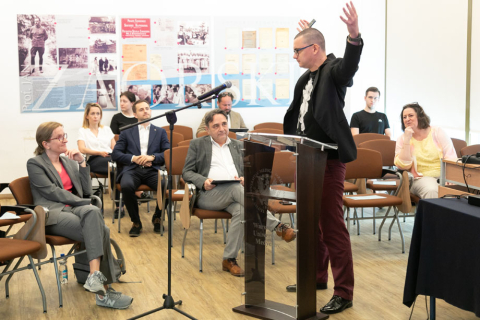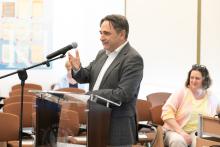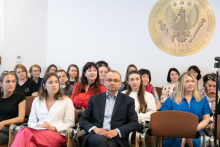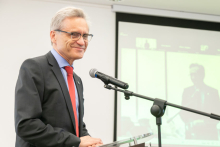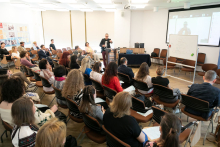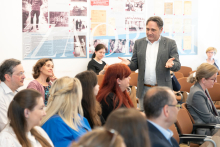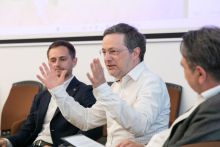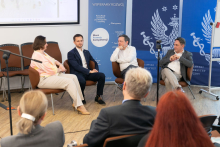This time, the „University Quality Culture Day” was held under the slogan “I came. I got it. I won? – about developing competences at the University”. The host was Piotr Dziechciarz, Chair of the university’s Team for Quality Education.
- These ‘Days’ already have a tradition that dates back two decades - reminded Prof. Zbigniew Gaciong, Rector of the Medical University of Warsaw, opening the symposium. - The issue of quality of education is extremely important today. In our country, and especially in Warsaw, where we have five schools offering medical education, quality is starting to command good price. Quality may be the factor that makes a high school graduate choose this university and not another one.
The Rector also emphasized that the area of education quality is the one that requires the greatest changes at our university.
- Today we will learn from the best models. These models need to be implemented. What is good, what works, must be implemented in our units: departments, faculties and clinics. This is one of the most important goals to be achieved in the coming years - said Prof. Gaciong.
What are competences?
Various definitions of “competences” were quoted by Maksymilian Radzimirski from the Competence Development Office of the Medical University of Warsaw. In his speech, entitled “Competences, or ‘stuff like that’” he emphasized that this concept is difficult to define. Actually, everyone knows what it means, but it is difficult to put it into words. The speaker also pointed out that “competences relate to many areas that form the so-called ‘competence pyramid’. These are not only knowledge and skills, but also personality and social sphere. Exams check knowledge but no one examines predispositions, i.e., in the case of a medical school, whether a given candidate for a doctor, for example, has the predispositions to be a good medic. Maybe it would be worth doing this...”
About education in secondary schools
A very interesting panel concerned teaching in secondary schools and was entitled “What youth is used to, age remembers – a discussion panel about university candidates”. It was attended by Dr. Monika Franczak-Rogowska from the Department of Drug Chemistry, Pharmaceutical and Biomedical Analysis, Jan Wróbel, journalist, teacher, co-founder of the 1st Public Secondary School, and Maciej Rusiecki, principal of the 5th Prince Józef Poniatowski Secondary School in Warsaw.
The discussion focused on what changes need to be introduced in secondary school education so that better-prepared candidates enter university. Jan Wróbel argued that a new core curriculum written by experienced teachers is necessary. Importantly, it should be prepared so that students can see links between different areas of knowledge, i.e. individual subjects at school, for example between biology and chemistry, biology and physics, etc.
Dr. Franczak-Rogowska, on the other hand, pointed out that student candidates often lack important skills such as the ability to analyze, draw conclusions or select information. They cannot learn effectively and have communication problems. How to change this? According to Maciej Rusiecki, it is worth introducing an additional “subject” in which students would learn how to learn from the first year of secondary school.
Feedback and grading system
The conference also discussed relationships between students and teachers. The panel “Who keeps company with the wolves will learn to howl – about the common path of students and teachers” was attended by Prof. Dominika Nowis from the Laboratory of Experimental Medicine of the Medical University of Warsaw, Julia Krzemińska, midwife, student of public health, and Aleksander Pawlicki, teacher of history, social studies, philosophy and rhetoric, lecturer at the School of Education of PAFF and the University of Warsaw.
Prof. Nowis emphasized the role of feedback in her speech. She referred to her own experience and surveys that she prepares for her students.
- Internal surveys, drawing conclusions from them and implementing changes are a necessity - said the speaker.
Aleksander Pawlicki also devoted his speech to feedback. He explained what it is not and when it does not fulfill its role. He also explained the difference between assessing the learning process and assessing outcomes.
Julia Krzemińska talked about communication between students and teachers. She referred to “Nonviolent Communication:…” by American psychologist Marchall Rosenberg. According to this method, we should communicate honestly and receive the other person’s messages empathetically.
What are the expectations of graduates?
The last panel was titled “What we and they want – about the expectations of graduates and towards them.” This discussion was attended by Dr. (hab.) Lena Serafin, Chair of the Faculty Team for Quality Education at the Faculty of Health Sciences of the Medical University of Warsaw, Magdalena Sosnowska, recruiter at Talent Flow and career mentor at Misja Kariera specializing in the Life Sciences sector, and doctor of social sciences Jakub Sokolnicki, Head of the Competence Development Office.
The conversation was led by Dr. Antonina Doroszewska from the Medical Communication Department of the Medical University of Warsaw. They discussed the expectations of employers, the needs and expectations of graduates, and what the university can do to meet these expectations of both parties.
“University Quality Culture Day” with the slogan “I came. I got it. I won? – about developing competences at the University” took place on May 24, 2024 at the Library and Information Center. It was also possible to participate in it online. The event was organized by the University’s Competence Development Office.
